
Audition is a 1999 Japanese horror film directed by Takashi Miike, based on the 1997 novel by Ryu Murakami. Starring Ryo Ishibashi and Eihi Shiina, the film is about a widower, Shigeharu Aoyama (Ishibashi), who stages a phony audition to meet a potential new romantic partner. After interviewing several women, Aoyama becomes interested in Asami (Shiina), whose dark past affects their relationship.
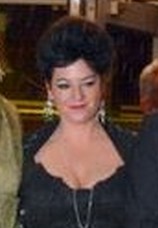
Lynne Ramsay is a Scottish film director, writer, producer, and cinematographer best known for the feature films Ratcatcher (1999), Morvern Callar (2002), We Need to Talk About Kevin (2011), and You Were Never Really Here (2017).
Ayumi Ishida is a Japanese actress and singer. Her real name is Yoshiko Ishida. She is the second among four daughters. She won the award for Best Actress at the 4th Yokohama Film Festival for Yajūdeka. She also won the awards for best actress at the 29th Blue Ribbon Awards and the 11th Hochi Film Award for House on Fire and Tokei - Adieu l'hiver.
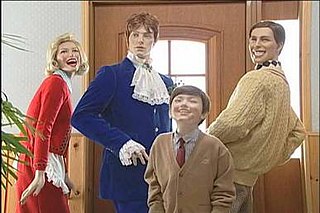
The Fuccons, known as Oh! Mikey in Japan, is a Japanese sketch comedy series created by Yoshimasa Ishibashi. It features the Fuccons, a family of American expatriates living in Japan, with characters played by mannequins filmed at various locations in real-time.
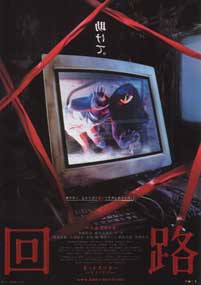
Pulse is a 2001 Japanese techno-horror film directed by Kiyoshi Kurosawa. The film was screened in the Un Certain Regard section at the 2001 Cannes Film Festival. The movie was well-received critically and has a cult following. An English-language remake, also titled Pulse, debuted in 2006 and spawned two sequels. The script was also adapted into a novel of the same name by Kurosawa himself.

Sion Sono is a Japanese filmmaker, author, and poet. Best known on the festival circuit for the film Love Exposure (2008), he has been called "the most subversive filmmaker working in Japanese cinema today", a "stakhanovist filmmaker" with an "idiosyncratic" career.

The Girl Who Leapt Through Time is a 2006 Japanese-animated science fiction romance film produced by Madhouse, directed by Mamoru Hosoda and written by Satoko Okudera. Released by Kadokawa Herald Pictures, the film is a loose sequel to the 1967 novel of the same name by Yasutaka Tsutsui and shares the basic premise of a young girl who gains the power of time travel and repeatedly relives the same day in a time loop, but with a different story and characters than the novel. Riisa Naka voices teenager Makoto Konno, who learns from Kazuko Yoshiyama, Makoto's aunt and the protagonist to the original story, that Makoto has the power to travel through time. Makoto begins using the time-leaps frivolously to fix problems.

Anna Ishibashi is a Japanese actress and model.

Christian Filippella is a producer, cinematographer and director, current member of the Producers Guild of America and the Television Academy (ATAS/NATAS).
Jōji Matsuoka is a Japanese film director. After studying filmmaking in the College of Art at Nihon University, he won an award for his independent short Inaka no hōsoku at the Pia Film Festival in 1984. He directed his first commercial feature, Bataashi kingyo, in 1990 and received a number of awards for best new director, including the Hochi Film Award. He won the Japan Academy Prize for best director for his film Tokyo Tower: Mom and Me, and Sometimes Dad. Matsuoka is known for his delicate depictions of complicated romantic and familial relationships, including a homosexual triangle in Kirakira Hikaru, a daughter caring for an abusive but now senile mother in Akashia no Michi, and a son caring for a cancer-stricken mother in Tokyo Tower. He has also shot many television commercials. His best known and most successful TV show is the Midnight Diner - Tokyo Stories.

Ildikó Enyedi is a Hungarian film director and screenwriter. Her 2017 film On Body and Soul won the top prize at the 67th Berlin International Film Festival and went on to be nominated for a Foreign Language Academy Award. She has directed eight feature films since 1989.
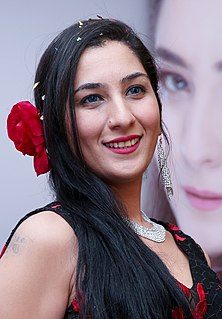
Ema Shah is a Kuwaiti singer, composer, pianist, guitarist, actress, writer, dancer, and director. Her father is Kuwaiti, and her mother is Iranian. At the 2014 Winter Film Awards in New York City she won the award for Best Music Video, she won Best Short International Film at the 2016 North Hollywood Cinema Festival, she received five awards at the 2013 Best Shorts Competition in California, she won Finalist Best Short Film at the 2013 Back in the Box Competition, and she received six nominations at the Best Shorts Competition and one in the 2014 St Albans Film Festival in the UK for her music video "Masheenee Alcketiara". In 2012, she sang to the Kuwaiti Prime Minister Prince Nasser Mohammed Al-Ahmed Al-Sabah, a song of the Kuwaiti heritage sung by Abdel Halim Hafez.

OneHope is an international ministry based in Pompano Beach, Florida. OneHope is working in over 100 countries to present a biblical message of hope to children and youth through age- and culturally-specific programs including: children's magazines, storytelling, animated movies, interactive games, sports programs, smartphone apps and more. Working with churches, partner ministries, local governments, schools and non-governmental organizations, OneHope has reached more than one billion children with a relevant presentation of God's Word. The organization also conducts research in 44 countries around the world to gain insight into children's daily lives, faith, cultural influences and values.
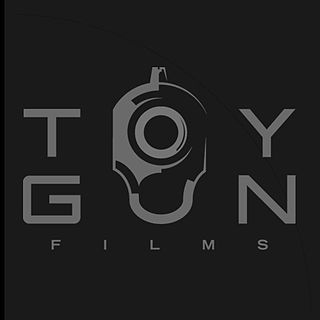
Toy Gun Films is a production company that is in the process of developing a diverse slate of art house films. The company believes that just like a toy gun is a weapon of imagination, film is a weapon of imagination that has the power to transform hearts and minds. The company was founded by Brent Ryan Green and Jeff Goldberg in 2009.
Brent Ryan Green is an American film director and producer.

Gekijōban Zero, also known as Fatal Frame: The Movie, is a 2014 Japanese horror film directed by Mari Asato, starring Ayami Nakajō and Aoi Morikawa, and based on a novelization by Eiji Ōtsuka of the Fatal Frame video game series. It was released on 26 September 2014.
Deborah Chow is a Canadian filmmaker, television director and screenwriter known for her independent films and her work on Star Wars television. Two of her first short films, Daypass (2002) and The Hill (2004) have both won awards at various international film festivals. Her first feature film was The High Cost of Living (2010), which she both wrote and directed.
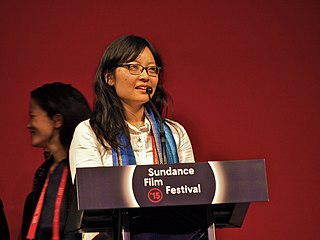
Jennifer Phang is an American filmmaker, most known for her feature films Advantageous (2015) and Half-Life (2008). Advantageous premiered at the 2015 Sundance Film Festival, winning a Special Jury Award for Collaborative Vision, and was based on her award-winning short film of the same name. Half-Life premiered at the 2008 Sundance Film Festival and won "Best Film" awards at a number of film festivals including the Gen Art Film Festival, the San Francisco International Asian American Film Festival as well an "Emerging Director Award" at the Asian American International Film Festival.

Tremble All You Want is 2017 Japanese romantic comedy film written and directed by Akiko Ohku. The screenplay is based on the 2010 novel of the same name by Risa Wataya.

Drive My Car is a 2021 Japanese drama film co-written and directed by Ryusuke Hamaguchi dealing with the grief and loss of a middle-aged theater director following the premature death of his wife. It is based on Haruki Murakami's short story of the same name from his 2014 collection Men Without Women, while taking inspiration from other stories in it. The film follows Yūsuke Kafuku as he directs a multilingual production of Uncle Vanya in Hiroshima and grapples with the death of his wife, Oto.















